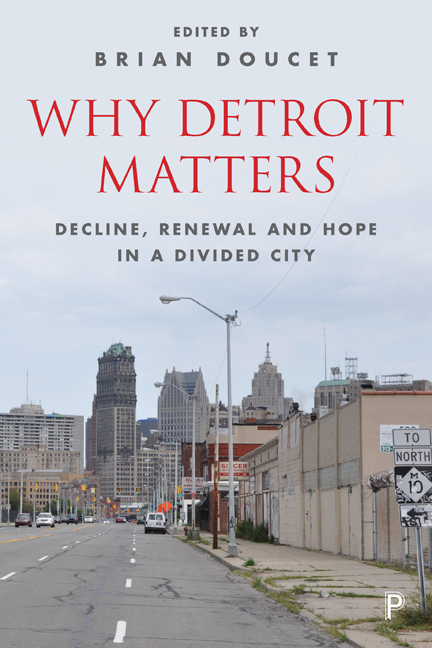Book contents
- Frontmatter
- Contents
- List of contributors
- List of figures and tables
- Acknowledgments
- one Introduction: why Detroit matters
- Section One Lessons from Detroit
- Intermezzo I You may not know my Detroit
- Section Two Practices from Detroit
- Intermezzo II My Detroit
- Section Three Conversations from Detroit
- References
- Index
sixteen - Artist and founder of DetroitYES
Published online by Cambridge University Press: 05 April 2022
- Frontmatter
- Contents
- List of contributors
- List of figures and tables
- Acknowledgments
- one Introduction: why Detroit matters
- Section One Lessons from Detroit
- Intermezzo I You may not know my Detroit
- Section Two Practices from Detroit
- Intermezzo II My Detroit
- Section Three Conversations from Detroit
- References
- Index
Summary
This final section of the book features interviews with inspiring and engaged Detroiters who have strong visions for the city and how to make it more inclusive, just and fair. Many of these voices do not regularly feature in either academic debates nor wider policy, planning or political conversations about the city. I consider it an honor and privilege to be able to feature these voices within this book.
Our first conversation is with Lowell Boileau, a Detroit-area-based artist and founder of the DetroitYES website. A fine art painter by training, Boileau began documenting the abandoned buildings of Detroit in the mid-1990s, long before it was fashionable or popular to do so. His Fabulous Ruins of Detroit web tour was an Internet sensation when it was launched in 1997. What sets this site apart from many others is the contextualization and explanation that comes along with his work. He has been described as a “longstanding documentarian” by Nate Millington (2013) and an “unofficial city historian” by Dora Apel (2015). Boileau lived in Highland Park between 1972 and 1999, and after moving with his family to Farmington in 1999, maintained a studio in the Michigan Building in Downtown. A visit to his web tour reveals “the story of modern day Detroit [that] will unfold in all its complexity.” His original Fabulous Ruins site has evolved into DetroitYES, a forum to discuss all things Detroit (see: www.detroityes.com).
Your Fabulous Ruins of Detroit web tour was one of the first places that showed Detroit's ruined landscape; what prompted you to set up that site?
It was a mix of mischief and concern. On the concern side, I am a champion of Detroit. I didn't feel that the story of Detroit was being fairly portrayed. I wanted to kick back against that by explaining, through the ruins, how the City of Detroit came to be what it had become. I wanted to bring to attention that some very important historic and architecturally significant properties were in danger of loss; that a loss of our heritage was at stake. There was a mischief side too. As far as city officials and most locals were concerned, they wanted to deny the ruins, shun them, and forget about them.
- Type
- Chapter
- Information
- Why Detroit MattersDecline, Renewal and Hope in a Divided City, pp. 277 - 282Publisher: Bristol University PressPrint publication year: 2017



